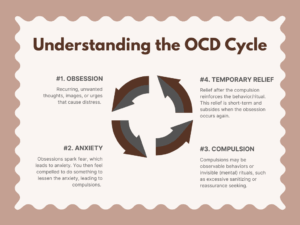Article written by OCD Denver therapist, Quin Axelson
Do you find yourself checking and rechecking whether the stove is off, the door is locked, or your curling iron is unplugged?
Do you sanitize your hands until you reach the number that feels “just right”?
Do you replay conversations or situations over and over in your mind to make sure nothing bad happened?
Do you seek reassurance – maybe more often than you’d like to admit?
If any of this sounds familiar, you’re not alone – and you may be experiencing symptoms of Obsessive-Compulsive Disorder (OCD). And while the acronym often gets thrown around casually, the reality is that OCD is far from enjoyable.
OCD can show up differently for everyone, but learning how it operates is the first step toward effective treatment and relief.
So, what is OCD?
OCD is a mental health condition characterized by the presence of obsessions, compulsions, or both. Symptoms can range from mildly frustrating to deeply distressing or even disabling. Some individuals may meet full diagnostic criteria, while others experience what’s known as subclinical obsessive-compulsive symptoms (OCS) – less obvious from the outside but still emotionally taxing.
What sets OCD apart from everyday worry is the amount of time these symptoms consume and how much they interfere with your life.
If your symptoms are significantly affecting your work, school, relationships, or other important facets of life, it may be worth exploring further.
What Are OCD Obsessions?
Obsessions are defined as intrusive, persistent, and uncontrollable thoughts, images, or urges that interfere with daily functioning. In adults, these obsessions are often understood as irrational, yet they can feel overwhelmingly real.
Common obsession themes include:
– Symmetry and organization
– Germs and contamination
– Religious or moral concerns
– Responsibility for preventing harm
– Sexual or aggressive urges
Obsessions often sound like:
– What if I touched something contaminated and now, I’m going to get sick?
– What if I don’t actually love my partner?
– What if I accidentally harmed someone and didn’t notice?
– Everything needs to be perfectly aligned, or something bad will happen.
What Are OCD Compulsions?
Compulsions refer to the repetitive physical or mental actions you feel compelled to perform to ease the anxiety caused by the obsession. Common compulsions include cleaning, counting, touching, and checking. Note that these compulsions reduce anxiety in the short-term, but they do not actually provide pleasure.
That’s why activities like compulsive gambling or eating typically aren’t considered compulsions – because they’re done for enjoyment rather than to relieve anxiety.
Compulsions might look like:
– Repeated checking of locks, outlets, or stoves
– Cleaning objects like doorknobs before touching them
– Overusing hand sanitizer
– Counting, praying, or repeating phrases in your head
– Mental reviewing until the thought feels “just right”
– Touching items a select number of times
– Seeking reassurance from others
Note that some compulsions are visible, but many are not. That’s why so many people suffer in silence or don’t even realize they’re dealing with OCD. See the hidden side of OCD below.
Understanding the OCD Cycle
OCD follows a predictable cycle: Obsessions > anxiety > compulsion > temporary relief > reinforcement.
For example, you might find yourself obsessing over germs and sanitizing, which leads to anxiety about getting sick, which leads to repeated hand washing. Yes, that behavior brings temporary relief, but the fear returns – stronger – and the cycle continues.

How did my OCD symptoms develop?
While the exact cause of OCD is unknown, research suggests it results from a combination of genetic factors, brain differences or abnormalities, and environmental influences. Other factors may include stressful life events and hormonal changes.
An individual with OCD, for instance, might notice that symptoms get “worse” when starting a new job, going through a breakup, moving to a new community, or during other stressful life transitions.
***What matters more than how OCD developed is what we can do next to prevent it from getting worse.
Making the Distinction: Intrusive Thoughts vs OCD-Related Intrusive Thoughts
Having intrusive thoughts is a universal human experience. Everyone gets them – fleeting, unwanted, perhaps disturbing thoughts from time to time.
What makes OCD different is your response to the thought, typically involving intense distress and a sense of urgency to do something (physically or mentally) to feel better.
You might recognize this as the “I have to” feeling; I have to arrange my skincare bottles in this exact order or something bad will happen; I have to mentally replay that drive to make sure I didn’t hit someone.
The Hidden Side of OCD: Mental Compulsions
Often, OCD is overlooked because compulsions aren’t always visible. Therapy for OCD can help uncover mental compulsions/acts/rituals that you may not realize you’re engaging in – yet these hidden behaviors might be the root of significant, underlying distress.
You might:
– Try to “neutralize” a thought with another thought
– Silently scold or punish yourself in response to an obsession
– Mentally replay a memory for reassurance
– Constantly seek certainty or mentally analyze situations
Over time, these mental acts can begin to feel like second nature, making them harder to recognize them for what they are.
In OCD therapy, you’ll work together with an OCD therapist to identify both visible and invisible pattens, create language to describe your experience, work to reduce the shame that often comes with them, and develop new ways of responding that break the cycle over time.
How OCD can impact your life:
OCD isn’t something that just lives in your mind – it can spill into almost every corner of. Your life. Work, school, relationships, and even your home life may feel the impact.
You might notice yourself avoiding various places, people, or activities that once felt safe and enjoyable.
Over time, pulling away from others, passing up opportunities, and hiding the internal battle can feel like the safest option. And when you don’t have the language to describe your experience, it can feel even more overwhelming.
The important thing to know is this: you do not have to go through it alone. With the right support and tools, it’s possible to regain control of your life and reconnect with the parts that bring excitement and meaning.
A Few Things to Remember With OCD
– You are not your thoughts
– Having an intrusive thought doesn’t mean it’s true or that you want it to happen
– OCD is treatable – and you are not alone
What’s next?
If any of this resonates with you or someone close to you, you’re in the right place. In OCD therapy the focus is on bringing compassionate awareness to the behaviors that may be fueling the OCD cycle – and reducing the shame that often keeps it going.
One approach we use at Denver Metro Counseling is Exposure and Response Prevention (ERP) – the “gold standard,” research-backed treatment for OCD – to help break the cycle and support lasting relief.
Taking steps toward treating OCD may not feel easy. We get that. And we are ready when you are.
Contact us today to get started with ERP or to learn more about OCD and therapy for OCD.

Denver Therapist | Quin Axelson
***
Quin Axelson specializes in treating OCD using ERP and other trauma-informed therapies like EMDR. Quin is a compassionate and skillful therapist who gets it. She will help you along your journey of finding relief from OCD.
In addition to working with OCD, Quin supports athletes and their loved ones, offers trauma therapy, helps people navigate complex trauma histories and relationships. She has advanced trainings in Exposure and Response Prevention (ERP) and EMDR therapy.


